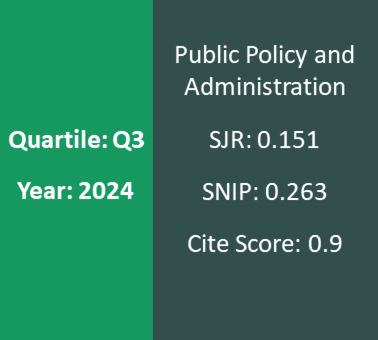Problems of Corruption and Responsibility in Public Administration
Keywords:
corruption, forms and types of corruption, administrative responsibility, anticorruption policy, national integrity system.Abstract
Corruption is an old social phenomenon intrinsic to governments, individuals, organizations, and countries, both
developed and developing. Despite sustained efforts of many states and international organizations to curb it,
corruption as an ethical and legal problem still exists. The author aim at tackling the phenomena of corruption and
responsibility not only at a theoretical level but also with attempts to model possibilities fighting corruption and
increasing public servants responsibility.
Paper starts with proposition that media role informing the public about corrupt behaviour of elected and
appointed officials are controversial in Lithuania as it creates the feeling of helplessness, mistrust, etc. Detailed
analyses of various concept of corruption are provided together with conclusion on three developing tendencies
trying to define this social phenomenon. 1) Term was expanded from seeking private towards organizational or
group benefit from the corrupt deal (personal/group interests). 2) Attention of researchers and practitioners moved
from solely public towards private, non-profit sectors as well (traditional/modern definition). 3) The context of the
problem had changed together with globalisation and internationalisation processes (national/global). Political,
administrative, private and international types of corruption are distinguished, naming several forms of corrupt
conduct (bribe, misuse of official position, conflict of interest, etc.). Social scientists approach the problem from two different methodological perspectives (moralistic and
functional). Various researches suggest different theories trying to explain the corruption. Historical-cultural
perspectives concentrate on political style and urbanization. Economists view the reasons of corruption in
misbalance between demand and supply, estimating level of risk and possible benefit. Organizational settings and
personal values approaches provide other two opportunities to view the corrupt behaviour.
Administrative corruption is influenced by the existing possibilities for public servant and personal inclinations
to benefit from them. Public servant duties require following a number of ethical principles and values
(disinterestedness, openness, transparency, impartiality, serving the public interest, responsibility and accountability,
etc.) in their day-to-day operations. Meanwhile principles of consuming society, which public servants are also part
of, encourage the use of rather different principles (seeking self interest, using the possibilities, etc.). Such opposing
pressures (market versus public interest orientation) create internal conflicts, which have a rather high price.
Corruption has a negative impact of political, social-economical, cultural development of the society. Fighting
corruption can’t be the end in itself. Transparency International founder J.Pope who stresses 3 important purposes
provides the answer why such struggle is important: rule of law, higher life quality and conditions for societal
development. Antipode of corruption can be the National Integrity System, which rest upon 11 elements. Favourable
conditions (pay, incentives, labour relationship, etc.) for public servants activity, control and accountability
mechanisms may increase their sensitivity towards unethical, corrupt practice. Legal and administrative
responsibility may serve as preventive measure in public sector. Together with prevention, persecution, and
anticorruption education are main directions fighting the corruption. To escape many negative consequences of
corruption, government efforts should be shared and supported by the public and private sector.





